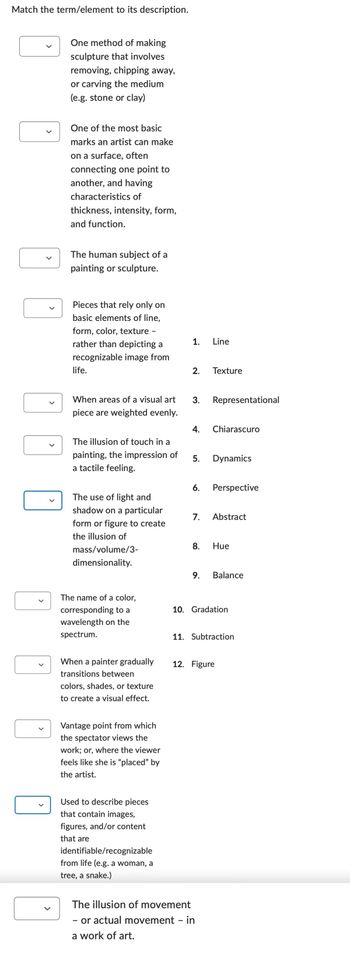
Social Psychology (10th Edition)
10th Edition
ISBN: 9780134641287
Author: Elliot Aronson, Timothy D. Wilson, Robin M. Akert, Samuel R. Sommers
Publisher: Pearson College Div
expand_more
expand_more
format_list_bulleted
Question
thumb_up100%
Humanities

Transcribed Image Text:Match the term/element to its description.
One method of making
sculpture that involves
removing, chipping away,
or carving the medium
(e.g. stone or clay)
One of the most basic
marks an artist can make
on a surface, often
connecting one point to
another, and having
characteristics of
thickness, intensity, form,
and function.
The human subject of a
painting or sculpture.
Pieces that rely only on
basic elements of line,
form, color, texture -
rather than depicting a
recognizable image from
life.
When areas of a visual art
piece are weighted evenly.
The illusion of touch in a
painting, the impression of
a tactile feeling.
The use of light and
shadow on a particular
form or figure to create
the illusion of
mass/volume/3-
dimensionality.
The name of a color,
corresponding to a
wavelength on the
spectrum.
When a painter gradually
transitions between
colors, shades, or texture
to create a visual effect.
Vantage point from which
the spectator views the
work; or, where the viewer
feels like she is "placed" by
the artist.
Used to describe pieces
that contain images,
figures, and/or content
that are
identifiable/recognizable
from life (e.g. a woman, a
tree, a snake.)
The illusion of movement
- or actual movement - in
a work of art.
1. Line
2. Texture
3. Representational
4. Chiarascuro
5. Dynamics
6.
7. Abstract
8. Hue
9. Balance
Perspective
10. Gradation
11. Subtraction
12. Figure
Expert Solution
This question has been solved!
Explore an expertly crafted, step-by-step solution for a thorough understanding of key concepts.
This is a popular solution
Trending nowThis is a popular solution!
Step by stepSolved in 2 steps

Knowledge Booster
Recommended textbooks for you
 Social Psychology (10th Edition)SociologyISBN:9780134641287Author:Elliot Aronson, Timothy D. Wilson, Robin M. Akert, Samuel R. SommersPublisher:Pearson College Div
Social Psychology (10th Edition)SociologyISBN:9780134641287Author:Elliot Aronson, Timothy D. Wilson, Robin M. Akert, Samuel R. SommersPublisher:Pearson College Div Introduction to Sociology (Eleventh Edition)SociologyISBN:9780393639407Author:Deborah Carr, Anthony Giddens, Mitchell Duneier, Richard P. AppelbaumPublisher:W. W. Norton & Company
Introduction to Sociology (Eleventh Edition)SociologyISBN:9780393639407Author:Deborah Carr, Anthony Giddens, Mitchell Duneier, Richard P. AppelbaumPublisher:W. W. Norton & Company The Basics of Social Research (MindTap Course Lis...SociologyISBN:9781305503076Author:Earl R. BabbiePublisher:Cengage Learning
The Basics of Social Research (MindTap Course Lis...SociologyISBN:9781305503076Author:Earl R. BabbiePublisher:Cengage Learning Criminalistics: An Introduction to Forensic Scien...SociologyISBN:9780134477596Author:Saferstein, RichardPublisher:PEARSON
Criminalistics: An Introduction to Forensic Scien...SociologyISBN:9780134477596Author:Saferstein, RichardPublisher:PEARSON Sociology: A Down-to-Earth Approach (13th Edition)SociologyISBN:9780134205571Author:James M. HenslinPublisher:PEARSON
Sociology: A Down-to-Earth Approach (13th Edition)SociologyISBN:9780134205571Author:James M. HenslinPublisher:PEARSON Society: The Basics (14th Edition)SociologyISBN:9780134206325Author:John J. MacionisPublisher:PEARSON
Society: The Basics (14th Edition)SociologyISBN:9780134206325Author:John J. MacionisPublisher:PEARSON

Social Psychology (10th Edition)
Sociology
ISBN:9780134641287
Author:Elliot Aronson, Timothy D. Wilson, Robin M. Akert, Samuel R. Sommers
Publisher:Pearson College Div

Introduction to Sociology (Eleventh Edition)
Sociology
ISBN:9780393639407
Author:Deborah Carr, Anthony Giddens, Mitchell Duneier, Richard P. Appelbaum
Publisher:W. W. Norton & Company

The Basics of Social Research (MindTap Course Lis...
Sociology
ISBN:9781305503076
Author:Earl R. Babbie
Publisher:Cengage Learning

Criminalistics: An Introduction to Forensic Scien...
Sociology
ISBN:9780134477596
Author:Saferstein, Richard
Publisher:PEARSON

Sociology: A Down-to-Earth Approach (13th Edition)
Sociology
ISBN:9780134205571
Author:James M. Henslin
Publisher:PEARSON

Society: The Basics (14th Edition)
Sociology
ISBN:9780134206325
Author:John J. Macionis
Publisher:PEARSON